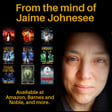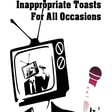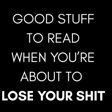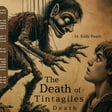Become a Creator today!Start creating today - Share your story with the world!
Start for free
00:00:00
00:00:01

Guest: Nightmare Man artist & author Larry Lugosi
The creator of Nightmare Man, Larry Lugosi discusses his influences, getting misdiagnosed, why humor and horror go so well together, and whether there's a connection between isolation and artistry. We name drop ZombieBurger and Drink Lab and a few other Des Moines landmarks. We talk Godzilla, SPAWN, Punisher, Poe, and why retail work is so much more difficult when you have to remember to smile.
Transcript
Introduction and Guest Introduction
00:00:02
Speaker
You are listening to The Mentally Oddcast, where we talk with creatives about neurodivergence, trauma, addiction, and all the other things that impact and inform our art. Our goal is to show everyone that no matter what you're going through, you are not alone and you can make art about it.
00:00:34
Speaker
Hey friends, it's me, Wednesday Lee Friday, and you are listening to the Mentally Oddcast. This week, we are speaking with Larry Legosi. He is a 28-year-old comic book artist born and raised in Des Moines, Iowa, ah brought up on monster movies like so many of us, comics and heavy metal. He aims to leave his own mark on the pop culture he loves so deeply. A laudable goal, sir. Welcome, Larry.
First Horror Movie Experience
00:01:02
Speaker
Thank you very much for having me, Wednesday. It's an honor to be here. Oh, it's our pleasure for sure. So one of the things that we like to start out with with our guests, especially horror people, is just to have you talk about the first horror movie that you saw or that you remember seeing. Because some of us, you know, we've been watching them since we were babies. We could never say like the first one. But tell tell us your story.
00:01:29
Speaker
Uh, the first horror movie I ever remember seeing before I got into the stuff that I'm into was, uh, my dad put me in front of a TV when I was six and watched a killer clowns marathon. So we watched, uh, it's the mini series starring Tim Curry and then killer clowns from outer space back to back terrified clowns. So I was 13. Nice, nice. So the um those, oh gosh, what are they called? the the The Halloween, the haunted house movies where they go around to the different houses and they're looking for the scariest one. And then, do you know the movies I'm talking about? I think there's two of them.
Opinions on Horror Movie Remakes
00:02:07
Speaker
The extreme haunted house movies, bunch of creepy clowns in those. Very, very disturbing. Houses October built, that's what it's called.
00:02:16
Speaker
Gotcha. I've heard of that. Haven't watched it. I'll definitely have to check it out. though Yeah. Yeah. If you're a killer clowns guy, those are the thing that that kills me about it is it's one of those movies where one of the people is really reticent to go. And then all the things that happen are super horrifying. But yet somehow there's a sequel. And I'm like, nah, nah, if you go back to that after that first experience, I have no empathy for you seriously. Um, So yeah, it so what did you think of like the remake of it? Uh, admittedly I wasn't sure about it. I haven't watched it. i Gasp!
00:02:57
Speaker
I know, I know, but sometimes remakes can be hit or miss. Sometimes they can be less than expected, or they can be like the Evil Dead ah reboot, which I thought was really good. I liked it a lot. Okay. I sometimes I just ah don't really care to revisit some parts just because I'm one of those that's a little sick of the reboots. Oh, really? I say no, no, that's, that's a common like I don't share that view. I'm one of those people that will stand up and fight for the remake of Psycho. But I certainly understand that mindset.
00:03:34
Speaker
You know, like there was that house of wax remake that was just awful. I mean, there's, there's certainly enough bad remakes out there, but you know what people don't realize is that the 54 house of wax movie with Vincent price is also a remake and that's the one everybody loves. So that's true. And so is the mommy, you know? Yeah. Yeah. You know, well, and one of my favorite non-horror movies is actually Cecil B. DeMille's Ten Commandments, but the 50s one, the 54 one with Charlton Heston, which again is a remake of ah of a 30s movie, a silent film. So I don't think it's it's just about remakes often being subpar, but that a lot of people make remakes that ah don't really need to happen and they don't have anything new to add.
00:04:21
Speaker
You know, ah because, aon because, you know, for every Paris Hilton, the house of wax, there is a ah John Carpenter's the thing. And some of these remakes are well worth having. Jeff Goldblum as the fly. um Yeah, but everything needs more Jeff Goldblum. Well, yes, yes. I mean, i all all horror movies should be remade starring Jeff Goldblum. Jeff Goldblum is Jason Voorhees. His ghost face i Hannibal Lecter. Jeff Goldblum. See, that's. Yeah. Yeah. Get get me an agent for it.
00:04:56
Speaker
yeah So, um, so your, uh, pen name, is it still
The Story Behind 'Lugosi' and 'Nightmare Man'
00:05:01
Speaker
called a pen name? If it's a comic book artist, I don't actually know, but your pen name is Lugosi and, uh, I need to know why I need to know why. Well, my real name is Larry Crane, and the reason I chose a pen name is because I also share my real name with a self-help artist, a self-help author, ah who's really into yachts, and I really didn't want, you know, somebody looking for his stuff and end up finding mine, and then looking for my stuff, end up finding his, I thought would be confusing.
00:05:31
Speaker
And Bela Lugosi, especially as Dracula, is my favorite actor of all time. And i the sound of his name makes my mind just sounded kind of cool and mysterious, not just like alliteration. I once had a friend tell me it sounded like an alcoholic drink, and I want to think what a Larry Lugosi cocktail tastes like, you know? Well, we should all become famous enough to have a cocktail named after us. I mean, that's that's just a given. And I think, yeah, I think a Larry Lugosi sounds sort of red. I think they're they're finishing that with, ah oh, I forget what that red stuff is. They put in drinks. It's like cherry. It's really good.
00:06:13
Speaker
I forgot how to remember things today. not Not very good for a host. um It's one of those things. Right? So um so your comic is is called Larry Lugosi's Nightmare Man. What do we need to know about it? So I created the character of Nightmare Man when I was 13 years old. And the goal of this comic is basically to combine a lot of things I grew up loving, you know, the superhero action of say like Spawn or Spider-Man with like something out of a Tim Burton movie, you know? okay I would say, you know, I want my comic to be, you know, what the original Ninja Turtles was.
00:06:58
Speaker
and way you know because the original teenage mut ninja turtle start out as both a parody and an homage of frank miller's ronan and daredevil runs while maintaining its own identity i want mine to do that as well but more based on tom mcfarlane's spawn Okay. The main difference being that my series has a sense of humor. you know You're allowed to have fun with it. know If I wanted to write something that's overly grimdark, go read a Spawn comic. you know That's not what I'm doing here. I have to write stuff with humor. It can't all be overly dark.
00:07:33
Speaker
See, I love that so much. I don't know if you know, but this show, The Mentally Oddcast, is sponsored by our magazine, Sometimes Hilarious Horror. And it's a quarterly horror lit mag where um there is a lot of straight horror. Sometimes there's something so depressing it'll knock your socks off with depression. But um for the most part, it's a lot of witty horror and and dark comedy. So we're we're totally with you on that. And you know, we're always looking for cover artists. Our cover artist for the next issue, which comes out this week, is they are 13 years old, and they gave us a dope ass cover. So I'm really excited for people to see that. So you you should send us a cover, man. Make us some art. Yeah, I'd love to.
00:08:20
Speaker
so
Larry's Autism Diagnosis Journey
00:08:21
Speaker
All right. So, so you're actually, um, your, your mental health diagnosis is autism. And it sounds like you've had that diagnosis for long enough that they were still saying Asperger's syndrome. That's right. I've been, I was diagnosed at about, um, eight, I believe after an unfortunate incident where a school nurse who really did not have the qualifications to be a school nurse labeled me schizophrenic. Oh, no. And so my mother.
00:08:51
Speaker
And my therapist at the time took me out to a facility in Iowa city to get me tested. And they were like, no, he's as far from schizophrenic as it gets. He's autistic as all hell. Sure. But he is not schizophrenic. And, uh, that lady did not keep her job. Oh, I would hope not. I mean, it seems like even if you are adequately trained as a school nurse, that you would probably not be also trained to make psychiatric diagnoses after, you know, a visit or two. especially by telling that to the child who was like seven or eight at the time. Yeah. Yeah. Now now you're saying that you already had a therapist at that point, which, um, it's kind of unusual from where I, where I'm from, but my parents were always really resistive to us having a therapy. So do do you feel that that was a lucky break for you having therapy that young? Honestly, yeah. Just because it was able to,
00:09:50
Speaker
help me navigate some things that have been otherwise difficult for someone who is neurodivergent, you know, being able to have a safe space to properly, you know, vent certain things that most parents who are unaware of some things really aren't equipped to. And that's not saying my parents did a terrible job of looking after me, they did everything they could, but a little help, you know, is something that everybody needs, whether you like it or not.
00:10:19
Speaker
You know, that's something I still struggle with, asking for help in any given situation, but that's just something I've learned along the way. So the the term Asperger's syndrome, I'm aware that they don't use it anymore, but I am not extremely
Controversy Around 'Asperger's' Term
00:10:34
Speaker
literate in these matters. Can you explain like why that term is not okay? So the reason most people of autism frowned upon it is because the person who coined the term, a psychiatrist by the name of Hans Asperger, he was believed to have associations with Nazis and sent some of his child, yeah, and sent his child patients to various camps to be tested. And those who were considered workable or high functioning, as some call it these days, were sent to the work camps, while those who were considered low functioning or
00:11:13
Speaker
uh, inefficient or executed. So something with ties to Nazism is something we really don't want. You know, I certainly don't like putting, you know, whether or not that's completely fact, there's plenty of conflicting stories, but most of them point to, uh, Dr. Asperger being affiliated with Nazis enough to the point where that term, I feel uncomfortable with being used to describe my condition. Oh my God, I mean, even if you're not a straight up Nazi doing experiments on children and separating them out into like the good ones and the you know less useful ones, um that's so gross. I guess the the interesting thing about it is that one of the things that we've talked about on the show a few times is um why so many older adults, particularly women, are being diagnosed with autism now, as opposed to when they were in school.
00:12:10
Speaker
And it seems to go back to what you're saying that it isn't so much about noticing symptoms and recommending treatment as it is getting kids to sit in their chairs and be quiet and not interrupt the teacher. And if you're able to do that, then it's it's not necessarily seen. As long as you you aren't causing a problem, that means there's no problem. And it's it's staggering how inaccurate that can be. That it certainly is. I will agree on that. What was your experience in terms of getting treatment and accommodations, things like that, when you were in school?
00:12:46
Speaker
Uh, to be honest, for the first few years of elementary school, I didn't really get much accommodation. You know, they tried moving because my autism gave me some, you know, perks like being able to retain information and learn at a faster rate. I was able to take some more advanced classes, but in times where I couldn't regulate my emotions or had meltdowns, you know, their solution was to lock me in a room. and not tell my parents about it. And when my mom found out she raised all hell and pulled me out, I ended up going to an elementary program called the Focus Program, which is designed for neurodivergent kids. They helped me out. And even though it wasn't always easy, I was able to
00:13:32
Speaker
you know find my way, able to regulate my emotions in a way that was socially acceptable, I should say, or at least manage it until I could get somewhere safe like home or something of that nature. I see. So does that lead into, I mean, it sounds like something like that would be isolating, like it would feel isolating and then also it sounds like they literally isolated you. um Do you think that that's part of why you became an artist? Because it's such a solitary activity? I would say partially, but with my ah autism, it makes, I'm a,
00:14:17
Speaker
I'm not exactly what you call a social creature. You know, I'm a hermit. I'll be the first to admit that, you know, I like doing stuff on my own. I'll still hang out with friends and family, of course, but I've always been one that preferred to do projects alone, preferred to work alone just because sometimes getting, uh, help from others is not the kind of help I needed or wanted. And I had difficulty communicating that for a time. There are occasional inputs I get for my story, but for the most part, I handle everything myself. Just because it's, this is a character that's very near and dear to my heart. I've been working on him for 15 years. And I would not want anyone else's vision to overtake mine, if that makes sense. Oh, absolutely.
00:15:02
Speaker
Yeah, I was actually a theater major in college and theater is one of your more collaborative collaborative arts. So if you don't have people on the same page ah in terms of like theme and and you know just cohesiveness, it can really detract from the overall result. The thing about art though, comics is that you have to be adept at illustration, but also you're a writer as well. Like I'm a writer, I write books, but if i if I couldn't draw anything, it wouldn't matter and no one would know unless I told them. Whereas with a comic book artist, there's so much more to it. um Do you consider yourself a writer or or an artist? Are you keeping those separate?
00:15:51
Speaker
I would definitely call myself both. I prefer using the term artist just because most people will pay attention to the art more than the story when it comes to comics, but I write everything myself. I've been writing for years. I've actually got a very popular, uh, creepy pasta of mine called the forgotten Spider-Man, which people can still find readings of on YouTube and such. And even though I don't really care for it, it's still somehow popular. Even though I wrote it when I was 15, I think it's the cringiest thing ever. Well, I mean, if you're not slightly embarrassed of the things you produced as a teenager, that means you're not growing as an artist. So good news. All that cringe is is actually a good sign. Oh, yeah, I was looking to improve my writing, my art. You know, my writing, I like to think I've got down as far as the style I want to tell. But it's the art where I seek to strive the most improvement.
00:16:47
Speaker
You know, because I could sell a comic that's, you know, to quote Todd McFarlane, you know, that's drawn by Michelangelo and written by my dog. I could sell that, but if I sell a comic that's written by Shakespeare but drawn by my elderly mother, you know, I couldn't sell that, you know, and that's his words, not mine, but I think it gets the point across as far. So I want to improve as both a writer and an artist that way, not only can I tell the story the way that I want to, but in a way that really gets people's attention, you know, because the profit, whether or not I do is irrelevant to me, it's getting my story, my comic out to where people's hands where they can,
00:17:34
Speaker
they can enjoy it. Cause that's all I really want to do is to entertain people with my art. I've had tons of people over the years, you know, doing their own takes on my character. I've had friends and mentors all giving me tips and pointers and wanting to be invested and really pushing me to do the best I can with this. Cause this is something that means a lot to me. It really does. In terms of artistry, I would say my biggest influence is Todd McFarlane. Hence the reason I quoted him earlier. you know I followed his career with great interest. Spawn is one of my favorite comic book characters ever. I loved his run on Spider-Man. He co-created one of my favorite characters, Venom. And he's able to take traditional superhero art, but make it you know darker and take it to a gothic place that many artists don't really want to take it.
00:18:30
Speaker
And that's where Spawn came from. And he's able to mix his love of comics and horror in a way that reflects in his work. And that's what I want to do with mine. You know, everything that he is out there doing is something I want to do with mine. Now, granted, I'm never going to be able to draw like him, I imagine, but that's the thing. I don't want to be Todd McFarlane. I want to be Larry Lugosi. Right. You know, have a goal in mind, you know, emulate this guy, but not exactly, you know, step by step and do everything. Because if I just, you know, like I said earlier, if you want a Todd McFarlane book, go read Spider-Man. If you want a Larry Legosi comic book, read Nightmare Man. Nice, nice. Yeah, I have to say that Todd McFarlane, ah like I became interested in Todd McFarlane because of his his early lines of figures. He was making all these horror figures.
00:19:27
Speaker
and putting them out and they were a revelation for horror people because we never had, you know, of a fully articulated Michael Myers doll and then we did, you know. and And the thing about that is that seeing how much he cared about horror and how respectful he was to the genre as a whole and to like You know, McFarland and I tend to agree on who is important and who people, you know, who should be preserved. And because of that, I started watching Spawn because I wanted to know, like I'm like, this this guy gets it, so what else is he doing? And then you watch Spawn, and again, it is a revelation. That's a great influence, McFarland. But who else?
Literary and Animation Influences
00:20:14
Speaker
In terms of writing, God, it's difficult to say.
00:20:19
Speaker
ah I read a lot of Edgar Allan Poe growing up. Sure. You know, that's like any other kid who wore all black and socializing, which I very much so was. What's your favorite Poe story? Oh, easy. The Mask of the Red Death. Really? Always has been my favorite. Okay. All right. Just the sharp contrast between all the rooms and how this celebratory feeling was hiding, you know pushing away these feelings of dreads much like we do. you know We don't like to think about things that scare us. We don't like to think about things that are getting to us. So we try to push it all to the back of our minds until something happens that sends all that terror coming to the front. And that, is to me, is what that story is. you know The more you push away the things that scare you, the more likely they're going to haunt you.
00:21:17
Speaker
Mm hmm. When you least expect it. OK, yeah, I could see that. Yeah, see, I actually um you you kind of strike me as a Mathison guy. But the interesting thing about that is that Mathison actually wrote a couple of those post screenplays that got made into movies by American International. So Mask of the Red Death is one. And then he wrote Pit in the Pendulum. And I can never say no to Vincent Price movies. I really can't. Right? Like, why would you want to? I mean, exactly even the ones that aren't very good still have like, I mean, you can't look away like Witchfinder General. I don't find to be a ah particularly great film, but Vincent Price is so fucking evil in it. It's like irresistible.
00:22:08
Speaker
hu So, um, So you mentioned Nightmare Man and that it is a character that is near and dear to your heart. um Is Nightmare Man you? Admittedly, I didn't realize he was when I wrote him. I just wrote the way I would want want a protagonist to act, you know, to be scary, but at the same time have a sense of humor, you know, like a like how Spider-Man would be if he was spawned, kind of mixing those characters and being able to be scary one second and funny the next. And I had one of my best friends read the script of issue one, ah once it was complete. And he said, this is you, you know, reading Nightmare Man's dialogue, he's like, this is all stuff you would say. And this is how you would act in this situation. And I've known him for almost a decade. I've had the man as a groomsman
00:23:06
Speaker
at my wedding for Christ's sake. So this guy would know me pretty well enough to know. And I'm just like, huh, I guess he really did. I didn't mean to, but in a way, you know, when you write a character, especially for a long time, you find that more of them goes into you and more of you goes into them more than you realize. And it's kind of scary, honestly. Cause I never really intended for that, but just, that's just how it happened. Yeah. Well, I think that a lot of creators, um, the more passionate you feel about something, the more likely it is that you're talking about yourself in your own life. Um, cause like my, my first novel was a complete and total Mary Sue and it was planned that way from the beginning.
00:23:58
Speaker
And I thought that it was, it would be just inescapable that anyone who knew me would recognize me instantly. And a lot of people did. And a lot of people didn't, you know, they're like, well, this girl seems kind of crazy though. You're not crazy. Like, Oh, really? Since when? You know, news to me. I mean, obviously crazy is one of those terms that some people take issue with. I use it because I'm crazy. So I get to. But, um, how do you feel about that term? Are you, are you down with it? I'm kind of numb to it, to be perfectly honest. I wouldn't use it in a professional sense, but right you know, I don't think it's something that, you know, people really mean with serious intent. It's one of those things that I kind of just brush off. So I don't really give much thought to it.
00:24:52
Speaker
Yeah, I would agree that I think it's it's actually similar to the word evil in that it's a word we use when we're not sure what something is or what to call it. It sounds like you don't have like a formal education in art. Is that is that true? Yes and no, I didn't really go to art school, but as far as my comic book techniques, I actually did have some education in that. um I had classes run by a man by the name of Ron Wagner, who some of you may know from his work on G.I. Joe, Morbius the Living Vampire, Legend of the Dark Knight.
00:25:33
Speaker
You know, this guy is prolific. He's like the Stanley cameo of Des Moines where if you visit a zombie burger, any of the three locations around these, he actually did the murals. These beautiful zombie murals at all three locations. Hold up, hold up. Are you talking about zombie burger and drink lab? Uh-huh. There's three locations now? There are. That is dope. I interviewed that guy for Zombie Zone News when they opened the first store. And it just sounded so cool. I was so jealous that I could not make the road trip. I am thrilled to find out that they have three locations now. Oh, yeah. That is wonderful. My wife and I are actually frequent customers. We like to eat there pretty often. I bet. I bet. I had a look at their menu back in the day and it was dope.
00:26:25
Speaker
so So really, um as as opposed to dropping a few grand on art school, you were able to to network and get a lot of of feedback and and inspiration that way, it sounds like. Pretty much. I've had a lot of contact with people who are already in the Conchbook community. um And you know using comics themselves, there's no better reference for comic book work than comics themselves. So I'm taking a lot of stuff that I would say is inspiration. So you've got your darker stories like Spawn, Batman, Punisher, but I'm also consuming some more lighthearted stories so I can learn how to balance them out with humor.
00:27:07
Speaker
And it's not just comics I'll take inspiration from either. Like ah one of my big inspirations for the tone of Nightmare Man would be the Grim Adventures of Billy and Mandy show I grew up watching. Love that show. And the dark humor in there, but in a way that's suitable for kids, you know, cause I want to be able to sell my comic to a wide audience and I don't want to just go in with an R rated gore fest, at least not this early on. Right. You know, I want, people to grab my comic and be able to give it to their kids, word spreads around. so That way, you know the more people who get to read my comic, the more of these comics I get to make and keep telling these stories that have been rolling around my head for over a decade.
00:27:52
Speaker
Nice, nice. Now, it's interesting you bring out Billy and Mandy, because the first time I saw, well, it was called Grim and Evil initially. And I was so excited that this dark ah thing was was showing up like in the middle of the afternoon for kids, because that was kind of a turning point. Like 90s animation, there was that, there was Invader Zim, You know, SpongeBob kind of got tooled a lot. So it went to some fairly dark places from time to time. And I guess Ren and Stimpy probably kicked that off. The cartoon that looks like a kid's cartoon, but then you watch it and there's a ghost. It's really not.
00:28:37
Speaker
Well, even the later stuff, the the ghost that's in the haunted house and it's sad, and they try to find out why the ghost is sad. And he says, I couldn't scare a paranoid schizophrenic. hey co Poor ghost.
00:28:56
Speaker
But then that also becomes one of those, you know, Ren and Stimpy was a drag because John Kay turned out to be a monster. And that's another, like, the more the more artists you know and the more art you care about, the harder it is. I mean, obviously everybody's having a pretty tough time with Neil Gaiman this week. Yeah. We don't have to talk about it, but if you have anything you'd like to say about it, please feel free to do so. I'm just more disappointed.
00:29:27
Speaker
because Neil Gaiman is someone I looked up to in terms of, you know, as a writer, I loved his Sandman, I loved Coraline, and it was just disappointing to me. Yeah, i'm I'm with you. I mean, I wouldn't necessarily say, like, call the police, lock the man up, but I went from thinking of him as a safe person to not a safe person. You know, and it it is disappointing because I think, you you know, people say, oh, don't put artists on pedestals or whatever. But the thing is the, the artist and the work do go together. Maybe not so much for actors, but for writers and and visual artists, people that are just creating the entirety of the thing that you're seeing. If I don't like them, I.
00:30:20
Speaker
won't like the work. You know, I don't want to like the work if I think the person who made it is an asshole. You know, I'm i'm one of those people for whom Harry Potter is ruined. Like I'm an HP Lovecraft fan, for example, and the guy was a scumbag through and through. Sure. I love his work. You know, I love his mythology, but I don't have to, you know, like the man at all and or agree with his views, which I certainly don't. You know, the man was a racist, even by racist standards, and he was awful. Yep. Yep. I still partake in his stories because the guy's dead. You know, I'm not giving him money. And yeah, I feel that way about Poe. I mean, I love Poe. I love the work. We covered it earlier. um Stop falling in love with your 13 year old cousins, please. Yeah. Come on, Edgar. Do better. um And yeah, off the brandy, bud.
00:31:11
Speaker
Yeah, I mean, I get it. Opium is lovely. Nice, nice ah work if you can get it. But come on, you know, it's if it's lead you to make bad decisions. And actually, it's not even my business if people want to make bad decisions. But if you're involving other people in your bad decisions. That's, you know, that's always the line. We've talked about this on on the show a few times, like, well, where's the line? Where do you decide when something's not okay? And it's not okay when you start hurting other people. That's all it is. Yep, that's how I see it. I know writers like when I'm writing, I don't like to listen to music with lyrics in it because I find it distracting. And I know that a lot of visual artists feel differently about that. What what do you listen to while you're working?
00:31:58
Speaker
So when I like to work, I like to work to music because it helps me. Like if I have something playing in my head, it'll help me convey what I want to see on the page. Like if I want to write a dark story, I'll be listening to something like, uh, Knox Arcana, where it's got like the dark pipe organs and the creepy feelings but if I want to write an an action story I'll pump up something like Metallica that way I can convey that aggressiveness and that energy into the fights because I want to look cool and I
00:32:35
Speaker
it helps me get into a place where I want the story to tell it mostly depends. There are times where if I'm drawing for fun or drawing like practice sketches, I'll have something on like smooth jazz to calm my nerves. But if I'm really into the storytelling, I want whatever I'm listening to, to match you know, the tone I'm going for. Like one of my favorite songs is funny enough from a Scooby Doo movie. It's terror time again by Skycycle. I'll listen to that so often while I'm drawing Nightmare Man, because it really gets the vibe I'm going for with
Character Analysis of 'Nightmare Man'
00:33:12
Speaker
him. You know, he's here. And if you're a monster, or something that's out to hurt people, he's here to mess with you. And make sure you suffer for it. And he's got a laugh in your face while he's doing it.
00:33:26
Speaker
Nice. And that's the big thing between with Nightmare Man that I want to do in the story is the duality of the character when he's interacting with others. Like if he's fighting someone, like his main goal is to slay monsters like vampires, werewolves, demons, you know, that's all fair game to him. And he will be extremely cruel to his enemies because they're out hurting people. But if he's trying to rescue someone, especially children, know he's extremely kind and there's not a lot of characters I see that really do that it's all very one-note characters where like where they're always gruff or they're always not taking things seriously so I wanted to make him feel more fleshed out like he's someone you could trust and someone you can relate to you know even though he looks scary you know that this is a guy who's got your back cool I love that
00:34:23
Speaker
I love it. Who would you say is your ideal audience? I mean, I know you mentioned wanting to have like an eclectic audience and having like kids, but is is there a particular reader profile that you're looking at? Honestly, I'm looking I think my work would most attract the people who, like we were talking about earlier, grew up with stuff like Billy and Mandy, Invader Zim, but also stuff like Batman the Animated Series, you know Spawn, that kind of general audience of of people who like the creepier stuff, but aren't afraid to let it be fun too. That kind of people I feel like would be most appreciative of the story I want to tell.
00:35:06
Speaker
While I was researching you for this interview, um, I've happened to see your workplace and your workplace looks so frigging cool. So I, do you want to give it a shout out? You're certainly welcome to do so. Sure. Uh, I do my comic book work at night when I'm home, but during the day I work at JCD and hobby. You know, it's a big hobby shop that sells sports cards, video games, comic books, model kits, action figures. If it's something you want to collect, chances are my stores got it. I've been there for about three years now. They've been good to me. You know, the, my crew I work with, you know, it's, it's a brotherhood really, you know, I feel really close to these guys, even some of my associates who quite frankly are kind of goofballs. Well, I mean, we're all goofballs, but there's some more than others. I'm not going to name names, but if you're listening to this, you know who you are.
00:36:03
Speaker
But. I really love the workplace I do and it's a such a change of pace for me because my former jobs were all corporate entities, you know, deadlines and numbers and stuff like that. That's just very crimping, especially when they don't really take the time to understand my autism. and the difficulties it comes with because it impacts some of my motor skills, some of my, you know, ability to read social cues and my ability to process some things. Cause there's a lot of things when working behind the counter that I have to kind of script in my head to seem normal to others. Well, most neuro people would come very naturally, but there's stuff I have to remember. Like I have to remember the smile of the customer. I had to remember to take a certain tone. I have to remember to take.
00:36:53
Speaker
ah certain facial expressions because there's a lot of things I don't really think about when I'm off the clock that I just do that may make me come off as rude or cold when I don't mean to yeah no I that that was the bane of my existence I worked customer service jobs for over 20 years and I didn't understand fully why so many customers took issue with me And I thought that it was just because I didn't like take a lot of shit from strangers, but it seemed like I was coming off as rude when I thought that I was being practical and realistic because of things like that, because I wasn't smiling enough. And I, at the time I remember thinking, well, these people just want their asses kissed. That's not necessarily what I'm paid for. Um, Oh yeah. Because it seems like if I'm doing the job and I'm doing it correctly and expediently, that should be plenty. you know I shouldn't have to like make you feel great about yourself and your life in order to be considered you know a good cashier.
00:37:59
Speaker
Yeah, like I'm here to help you find your stuff. I'm here to help you find something like I'm not here to kiss your ass. Right, exactly. But but according to lots of customers, we are there to kiss their ass. Not only that, but there's that expression the customer is always right. And that's one of those things like a few bad apples where people forget that that's half of the sentence. You know, because the phrase is customers always write in terms of taste. Yes. Which means if you pick out something sorry go ahead if you want to come in and rent a shitty movie, I'm not going to stop you. Go home and watch a shitty movie if that's what you want to do.
00:38:39
Speaker
But pretty much you know, I think the the original example in that, that saying is like a hat. Like if you buy a hat that absolutely does not work for you, but you'd love it. It's not the the clerk's place to say, no, man, you look awful in that hat because the customer is always right in matters of taste. It's so fun to find somebody else that remembers the whole expression. ah Oh, yes. So wait. Oh, um I'm looking over my list because I write down all the questions I want to ask. um It's always so exciting when I get to have horror fans on the show because I forget that not everyone is a horror fan. there One time I asked someone what their first horror movie was and they actually tried to say that they've never seen a horror movie.
00:39:28
Speaker
And i I made it my mission. I'm like, no, you did. You just haven't didn't call it that. So what about this movie? What about this? Surely you've seen Jaws. What kind of adult hasn't seen Jaws? like What even is that? But you are a horror person. So what are you watching right now? What whether like are the last ah horror movies that you really liked? The last horror movie I watched is actually an old favorite of mine ah called Knights of Bad Assdom. Oh, okay. Peter Dinklage is in that. Yeah, yeah. I love him. well Yes, it's so fun to, because I play a lot of D and&D. It's actually how I met my wife, Sammy, is through D and&D. And so seeing, you know, people getting together, having fun, larping, and then suddenly, you know, get disemboweled by a hot succubus.
00:40:22
Speaker
The tone shift goes from fun to horrifying in such a way that really hits you, but you're still allowed to have fun with it. You know, the giant monster at the end, that makes me laugh my ass off to this day. A lot of people only really know Peter Dinklage from, like, Game of Thrones and the Marvel stuff, but there's so many other, like... I want to say he's in 13 Moons, but then also, like, the station agent. which is just a brilliant film, a cast of like three people basically. It is just amazing. I just got done ah binge watching another old favorite of mine, The Punisher. Nice. And I'm a big fan of that character from the comics. I feel like his symbol is very ah misappropriated.
00:41:12
Speaker
these days Well, John Bernthal agrees with you. Yeah, he does. And I feel like the people who just slapped that logo on without really understanding the character of Frank Castle just don't get it, you know? And I don't watch the show or read his comics because I think he's so idolized because he's not. He really isn't. But it's fascinating to me to watch the exploits of character who's just so far gone. yeah It's like watching a serial killer documentary or something like that to that nature because you just see what's going on in this guy's head and you know he's not all there. But he knows it too.
00:41:53
Speaker
But unlike somebody in like the rogues gallery, um, the Punisher is, is so much more like grounded in reality. You feel like you could sit in and have a rational conversation with him and you wouldn't like anything that you were hearing, but you would understand it. Oh yeah. But. Yeah, like this is a guy you can definitely understand where he's coming from, but without understanding, and without condoning, I should say, his methods. Right. Not every problem can be resolved by going scum, bang, done. So can you give me your top three favorite horror movies? All time. Easily. ah Number three, I would say, is The Exorcism of Emily Rose.
00:42:45
Speaker
Wow. Okay.
Top Horror Film Picks
00:42:46
Speaker
one That's one that got me when I was younger. You know, that's what really struck to my core as a, you know, what Tara can be without necessarily having to be an R rating. Mm hmm. Yep. Because the fear is psychological. And that's the kind of stuff I like is I like psychological horror films. I like ones that mess with you. I like the ones that haunt you after you put the book down or watch or shut the movie off. Yep, yep. The stuff that lingers because it's that lingering terror that really gets you. Number two, Evil Dead 2. Just because I love Sam Raimi's style, I love Bruce Campbell.
00:43:31
Speaker
And that movie is one I could always watch, you know, you can see the terror in these characters' eyes, we can also laugh with them. And it's just so much fun to watch. Like, it's so disgusting, but you can't look away and it's just so good. and It's like a burger at your favorite fast food restaurant. You know, it's bad for you, but you can't help but love it. hey And my number one horror film of all time, of all time, is 1989's Phantom of the Opera starring Robert Englund. Most people don't know about this version. and This is a little bit after the Andrew Lloyd Webber musical came out and a little around the time where you know Robert Englund is ready to hang up his Freddy Krueger gloves and pursue something different. It's such a wonderful paradox, because on one hand,
00:44:26
Speaker
it rips the context of the novel to shreds, but in terms of tone, in terms of how the film is shot and the way it conveys its story, it seems almost more accurate to the gothic tale of the book rather than, you know, the more love-centered yeah adaptations i mean the phantom it's really second only to dracula in terms of god damn it that's not supposed to be sexy that is a monster you know come on ladies do better in the original novel it was his voice that was this attractive he had the voice of an angel he had the ah face of a monster actually had a conversation about it with a friend of mine back in high school
00:45:11
Speaker
Because she knew the Phantom of the Opera through the 2004 Gerard Butler movie. And while I do enjoy that movie too, I feel like having someone as conventionally attractive as Gerard Butler in that role with makeup that doesn't really do the Phantoms to form any justice in my eyes, I feel like that misses the point of the character. Because he's not supposed to be hot, he's supposed to be horrifying. so with like parchment-like skin, a missing nose, a smell of death, creepy glowing eyes. yep No, that's my phantom. That's what I like. Exactly. Right on. That's interesting. Those are some deep cuts, I gotta say. Because because my top three are like way more mainstream than that.
00:45:57
Speaker
Um, cause you know, my, my, uh, none of the living dead psycho and the mist. So most of it isn't even that current. Cause I guess the myth, though the mist has got to be almost 20 years old at this point. Good heavens. Gotcha. I would also like to give a special shout out to the original 1954 Godzilla, because even though the term horror film is kind of up to debate with this one, the way this film operates as like, a metaphor for the bombings of Hiroshima and Nagasaki and the way the Japanese people suffered under it.
Impactful Films and Social Commentary
00:46:33
Speaker
Like I watched it. My best friend that I mentioned earlier, and he'd never seen it. He's knows Godzilla through like the goofy show era movies, the monster rumbles and all that. But he'd never seen the original. And there's a scene where a mother is holding her two children as Godzilla's rampaging through
00:46:52
Speaker
the town and everything's on fire and there's no way she can get out or her kids so all she can say is it's going to be okay we're going to see her father soon as the building crumbles around them yep you know that's something that's haunting you know that movie is haunting and that's why I love it so much people are being eaten alive in front of you that that counts as horror Like, yes, it could be action-packed, but if what you're seeing is horrifying, that can be a horror movie. Because again, you know, we used to have video stores where you had to pick one section to put a movie in, and and movies aren't like that anymore. Now that we're streaming, you could put movies in whatever genre they apply to. Did you see the the new Godzilla? I did. The one that's in Japanese?
00:47:40
Speaker
Yes, I actually went to go see that movie three times with my wife. We saw the regular color ah version, the first two, and then we caught the very last showing, which was the black and white minus color version. Oh my gosh. Yeah, i it captures that late night monster movie aura while also adding to the dread that feeling of a nation that's already destroyed by the bombings and made worse by this giant terrifying monster that exists for no other reason other than to hurt people. And but the thing that annoys me is the discourse people have between this movie
00:48:20
Speaker
and the other recently released film, Godzilla X Kong, you know, The New Empire. yeah And I feel like because they both have Godzilla in it, people feel the need to compare it, which those two movies are like apples and oranges. You really shouldn't. Like Godzilla minus one to me is a finely cooked dish from a five-star restaurant with all the bells and tassels and such. And Godzilla Kong, you know, is a big greasy burger from your favorite fast food joint. They're both starkly different, yeah but they're enjoyable in their own ways and should be enjoyed as such. Yeah, very much. Agree, agree, agree. And i I'm actually really jealous you got to see it in black and white.
00:49:05
Speaker
Cause you know, who's actually a big fan of that is a Frank Darabont. Um, cause the mist is available in black and white. If you get the the DVD, I think it's a two disc set and that that's available in black and white. Cause that's how he wanted to release it. It's also how he wanted to make the walking dead. And AMC said, hell no, you're not making a black and white show. And I mean, I have huge hate feelings toward AMC for the way that they treated Frank Darabont. Because I don't know if you remember, they went through a thing where they did a marathon of Walking Dead in black and white and acted like it was the most brilliant idea they'd ever had. And it's like, no, you dicks. Darabaugh wanted to do that. And you told him no. And now you're pretended like, I mean, that's just such a, just such a crappy, like, corporate thing. Yeah.
00:49:58
Speaker
It's just yucky. And it's like, you guys don't deserve an artist like Frank Darabont. You, you deserve, I don't even know. I don't want to insult any artists by saying AMC deserves them, but yikes. Right. Um, but yeah, I'm i'm all about more black and white horror. like Like a lot of those CGI sharky crap fest that they make now, a lot of those would actually look better in black and white because some of the CGI is so bad.
00:50:29
Speaker
Yeah, it's like those 1950s B movies. You gotta enjoy the flaws. That's what makes it so good. Oh yeah, totally, totally. um We're actually nearing the end of our time. um Sometimes our guests have questions for me. So if you have a question for me, now is the time to ask it.
Podcast Inspiration and Outreach
00:50:49
Speaker
So um what really gave you the inspiration to start these podcasts and reach out to those who may have difficulties that others aren't really aware of? Um, you know, it's an interesting question because it, this was an idea that I had thought of for a long time. I came up with the term mentally odd probably about 20 years ago and didn't know what to do with it. And then I used it in a book. I have ah a horror collection. My first horror collection was called creepy, stabby and mentally odd. And ah the more I thought about it, the more,
00:51:26
Speaker
I thought about how many artists I know that are even more spectacular because of what they've had to overcome to get to the point where they they do their art and also how much more meaningful the art is because I think neurodivergent artists are much more likely to do that that deep digging you know they're not trying to draw a pretty picture they're trying to paint their soul so that you can see it so that they can feel seen and understood
00:52:00
Speaker
And we can all feel more seen and understood. Like there's just this huge ecosystem of like people healing themselves and then reaching out to other people through art. And, you know, I really wanted to get in there and talk about that with people. And because so many people don't have that kind of network, it seemed like a good way to do outreach so that people who don't want to you know, be in a chat room or be on social media very much or whatever, so that you can hear these these things, hear people's experiences without necessarily having to participate. And a podcast seemed like a really good way to do that. Plus, I have a degree in broadcasting, so it made sense. Oh, no. All right. um was Was there anything else that you wanted to tell us about that I did not ask?
00:52:55
Speaker
I think we covered everything pretty thoroughly. Um, I would have liked to talk a little bit more about my character and what I wanted to do with it, but honestly, I would, now that I think about it, I would rather people pick up the book and judge it for themselves more than what I'd describe it to be. So is it available now? Can we buy it? Not yet, but I will notify everyone that's still in progress. The script is done. I'm currently doing the pencils for it. It will be available both in physical and digital when I finish it. And if you live in the Des Moines, Iowa area, you can pick it up from any participating JC and hobby location. My boss has actually agreed to let me sell the comic physically there. And I'm going to reach out to other comic book stores in the area and then
00:53:49
Speaker
you know, the more I work on it, the more I'll branch out. And because, but I also want to go digital because it's the easiest medium for people to get it. Oh, yeah, definitely copy. I'd rather they read it digital, as long as you know, don't buy her at my work, you know, it's fine if you do it to you know, one of the big two that, you know, don't really need the profits, but just reach out to me, man, I will happily find a way to work with you to get you the comic. Sweet. Sweet. And then if if we want to keep track of your progress, social media, probably Facebook is the best place to do that. Facebook and Instagram are the main two I use to promote. You will find both under the name Larry Legosi's Nightmare Man. I do also have a Cara account, but that's more for artists and me just like have a safe space for me to show off my work to other people who might be interested. But
00:54:42
Speaker
in terms of like story updates, where I'm going to be to promote the book, anything like that. You want to ah follow me on Instagram and Facebook under Larry Lugosi's Nightmare Man. All right, sweet. Well, it is time for the Madlib. Are you ready for this? All right. Okay. We have, let's see, one, two, three, four, five, six plural nouns. Let's have them. Oh, God.
00:55:17
Speaker
ah ah Bones, children, cows, ah knives, loops, and ah foxes. um or ah One more. ah Clutches. What is it? Clutches. All right, and one singular, nope, two singular nouns. ah War and music. Okay, now I need some adjectives. One, two, three, four, five adjectives. Elegant, kind,
00:56:04
Speaker
bewildered, panicky, and microscopic.
00:56:15
Speaker
Okay, cool. And I need a verb ending in I-N-G. ah Sleeping, which is probably what I should have done more of before getting ready for this podcast. Right, same. um And last one is a part of the body plural.
00:56:37
Speaker
part of the body plural, ah kidneys. All right, so that is completed. This is called good health to one and all. An elegant fitness revolution is taking place. Today, millions of people are doing all kinds of kind exercises, such as jogging, walking and sleeping to get their kidneys in shape and develop their bones. Oh wow, that totally worked. Um, many go to gyms and health children to work out by punching a war, lifting cows, or performing aerobic knives. Love it. In the past, music people have become very weight conscious. They have learned what loops they should or should not eat. Like, fruit loops, I assume. Um, they know it's healthy to eat green foxes and bewildered fruit.
00:57:38
Speaker
hey They also ah know to avoid foods high in clutches and microscopic fats, especially if they want to lead a long and panicky life.
00:57:52
Speaker
Who doesn't, right? Who doesn't want a long and panicky life? I don't know. Most Americans? Well, that's what we got, though. Sorry. Sorry, America. Let us all now panic. um Well, Larry, thank you so much for being here. It was wonderful having you. I loved hearing about your work and I cannot wait to check it out because it sounds right up my alley. Thank you very much, Winston. I really appreciate this opportunity and it was an honor to be here. Aww. all right so hey um i just want to remind all our listeners that we are sponsored by sometimes hilarious horror and you can find us on ko-fi um and that we will see you next week















